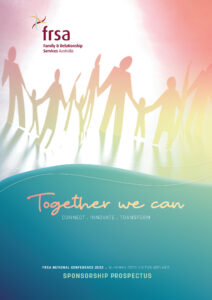
No. 21, 2021 | 17 December 2021
Go to:
From FRSA's Executive Director
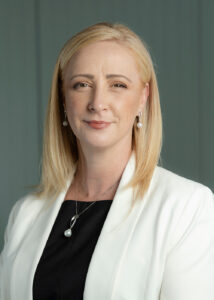
I have been reading with interest AIFS’ recent ‘Families in Australia Survey’ report – focusing on ‘Relationships within the family’. Unsurprisingly and pretty resoundingly – the Report highlights the importance of families and relationships and the important role they play in the wellbeing of individuals. I think that the whole COVID-19 experience – even though felt differently in Australia depending on which state/territory you live in – further emphasised and highlighted this importance. I am a softie at the best of times, so the images from earlier this week of families and friends reuniting after the Queensland border opened were so reflective of the intense emotions being felt and expressed by people seeing each other after so long apart.
The ‘COVID tentacles’ are increasing the complexity of children, women and men our services are seeing with demand being felt at unprecedented levels in many programs in numerous areas across the nation. We have embarked on important conversations in the sector around telepractice and service demand which have been tested and challenge by COVID-19 and look forward to continuing to influence thinking around these issues in the new year.
Whilst funding for family and relationship services is now secured for the next 3-5 years, we know that current funding levels are inadequate for keeping pace with costs. We are also contending with workforce shortages in our sector given the skills we rely on are also in high demand in other sectors such as mental health and family violence.
Throughout 2021, FRSA has been continuing to support our members who have been working hard to support children, families and communities across Australia. Working remotely in support of our sector has taught us that much is possible via technology but I must concede that I am missing being out and about in the services – I do hope that 2022 raises the prospects of this happening once again. We also remain confident that the FRSA Conference in Adelaide, 16-19 May 2022 will go ahead as currently planned. We received a record number of abstracts and the FRSA Conference Reference Committee members are busily reviewing those ahead of the year’s end. We are aiming to have notifications out to authors in early January with a Conference program published shortly thereafter.
None of this is possible without the ongoing support and engagement of our members. I continue to say that as a peak – we are nothing without our membership. So, thank you. MY thanks also to the FRSA Board for your ongoing strategic vision and leadership of the organisation. And, of course, to my staff – for your unwavering commitment and dedication to your work and the sector.
Even with all the uncertainty circling around at the moment – I am so looking forward to Christmas. Last year went a bit pear shaped with all the border closures so being with my nearest and dearest was not possible – as was the experience for many, many people. However, my heart is filled with hope that this year will be different and we will be able to come together at Christmas/New Year in love and friendship.
May I extend my best wishes to all of you for a wonderful Christmas and New Year.
The FRSA National office will close from 1pm Friday 24 December and will re-open on Tuesday 4 January 2022.
Kind regards,
Jackie Brady
FRSA Executive Director

New National Report: Safety of Children in Care 2020-21
 The Australian Institute of Health and Welfare (AIHW) has released its first report on the safety of children in care in Australia. The report, Safety of children in care 2020-21, presents information on children abused while in care throughout the 2020-2021 period. Devastatingly, 1442 children were the subject of a substantiation of abuse in care. Out of these children, 41% were aged 10-14 years and 27% were 5-9 years old, with physical abuse being the most common form. Almost half (46%) were Aboriginal and Torres Strait Islander children, reflecting the over-representation of Indigenous children in care.
The Australian Institute of Health and Welfare (AIHW) has released its first report on the safety of children in care in Australia. The report, Safety of children in care 2020-21, presents information on children abused while in care throughout the 2020-2021 period. Devastatingly, 1442 children were the subject of a substantiation of abuse in care. Out of these children, 41% were aged 10-14 years and 27% were 5-9 years old, with physical abuse being the most common form. Almost half (46%) were Aboriginal and Torres Strait Islander children, reflecting the over-representation of Indigenous children in care.
Data presented in the report has emerged from a new national data collection which was established in response to a recommendation from the Royal Commission into Institutional Responses to Child Sexual Abuse. In future reporting, the data on safety in care will be included in AIHW’s annual children protection report next scheduled for release in 2022.
ANROWS overview of reviews of respectful relationships and bystander programs
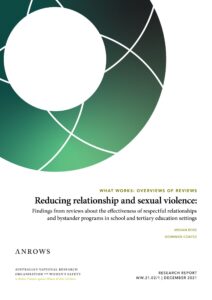 ANROWS has just published an overview of reviews of respectful relationships and bystander programs in education settings. These programs seek to promote health and equal relationships and reduce sexual and dating violence experienced and perpetrated by young people, in and out of relationships, by equipping them with the attitudes, knowledge and skills to confront violence.
ANROWS has just published an overview of reviews of respectful relationships and bystander programs in education settings. These programs seek to promote health and equal relationships and reduce sexual and dating violence experienced and perpetrated by young people, in and out of relationships, by equipping them with the attitudes, knowledge and skills to confront violence.
This is the first in a series of three overviews of reviews, which are a part of a bigger ANROWS “What Works” project.
The overview – Reducing relationship and sexual violence: Findings from reviews about the effectiveness of respectful relationships and bystander programs in school and tertiary education settings – found promising results for both respectful relationships and bystander programs around changing attitudes and increasing knowledge. Findings in relation to the programs’ effectiveness at reducing violence were more mixed and the report notes that further research is needed in this area.
AIHW release new reports on family, domestic and sexual violence
 On 16 December, the Australia Institute of Health and Welfare (AIHW) announced the release of new data on family, domestic and sexual violence. The release included:
On 16 December, the Australia Institute of Health and Welfare (AIHW) announced the release of new data on family, domestic and sexual violence. The release included:
- Examination of hospital stays due to family and domestic violence 2010–11 to 2018–19,
- a short report focusing on data from January to June 2020, Family, domestic and sexual violence service responses in the time of COVID-19,
- and a new series of interactive visualisations, Family, domestic & sexual violence data in Australia.
Data from the Examination of hospital stays due to family and domestic violence 2010–11 to 2018–19 sadly showed 29,210 people had at least one hospital stay due to family and domestic violence, majority of those were female (68%) and aged 15-44 years.
The release aims to better inform Australians about family, domestic and sexual violence by providing a new analysis on a wide range of resources.
The Family Matters report 2021
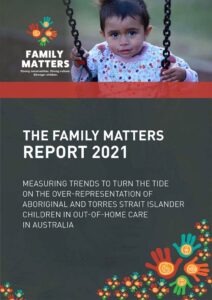 The 2021 Family Matters Report last week at the 9th SNAICC Conference and shows that Aboriginal and Torres Strait Islander children continue to be removed from family and kin at disproportionate rates. This is despite overwhelming evidence about the harm this causes to children, families and communities.
The 2021 Family Matters Report last week at the 9th SNAICC Conference and shows that Aboriginal and Torres Strait Islander children continue to be removed from family and kin at disproportionate rates. This is despite overwhelming evidence about the harm this causes to children, families and communities.
The report found a staggering 21,523 Aboriginal and Torres Strait Islander children were in out-of-home care at 30 June 2020, 79% of which are on long-term permanent care orders and at risk of permanent disconnection from their family and culture. It also finds that less than half (42%) of Aboriginal and Torres Strait Islander children in out-of-home care are living with Aboriginal and Torres Strait Islander carers.
“This report makes for uncomfortable reading. Our children are 10 times more likely to be in out-of-home care or permanent care, a figure that continues to increase every year. This should be unacceptable,” Family Matters Co-Chair and SNAICC – National Voice for our Children CEO Catherine Liddle said.
“All children deserve to know who they are, grow up connected to their Mob, family and kin – learn their stories and pass them on to future generations. Yet sadly, for many of our children, this is taken away from them.”
The report also highlights the impact of poverty, homelessness, intergenerational trauma and social exclusion on families, and the inadequate responses.
FRSA National Conference 2022 - REGISTER TODAY FOR EARLY BIRD RATES!
As we look forward to 2002, don’t forget to register for the FRSA National Conference 2022 and take advantage of our Early Bird discount rate for your conference registration!
| Registration Categories | Early Bird Registration Fee* until 31 January 2022 |
Standard Registration Fee** from 1 February 2022 |
| Member Complete Conference Experience (Including dinner) |
$995.00 | $1,195.00 |
| Member Conference Only (No dinner) |
$920.00 | $1,120.00 |
| Non-Member Complete Conference Experience (Including dinner) | $1,295.00 | $1,495.00 |
| Non-Member Conference Only (No dinner) |
$1,220.00 | $1,420.00 |
Want to send more than one person? The Conference registration also offers a ‘6 for 5’ promotion for all FRSA Members only. Simply enter the names of 5 members you will register in one transaction and when complete, you’ll receive a link and code in your confirmation email to register your 6th attendee. Available at both Early Bird and Standard Rates. Interested in becoming an FRSA Member? More information here.
Stay up to date by subscribing to our Conference and Forum Updates.
Sponsorship has always been a big part of FRSA’s Conferences and in acknowledgement of this support, we have a range of new packages for our 2022 Conference which we have designed to allow for maximum visibility to showcase the work and activity of your organisation/business. It will enable you to engage, discuss challenges and present solutions to FRSA Conference delegates.
We welcome your support of the Conference and hope that you will take advantage of the opportunities available to you in joining with FRSA as a Conference 2022 sponsor.
If you are interested in a more bespoke package for your organisation, outside what is outlined in our Sponsorship Prospectus, do not hesitate to get in touch with the FRSA team at admin@frsa.org.au or on (02) 6162 1811.

Appointment to the Federal Circuit and Family Court of Australia
On 10 December the Attorney-General Senator the Hon Michaelia Cash, and Senator for the ACT Zed Seselja, announced the appointment of Mr Gavin Mansfield as a judge of the Federal Circuit and Family Court of Australia (FCFCOA) (Division 2). He will commence on 13 December 2021.
Mr Mansfield has been appointed to the Canberra Registry. He was admitted as an Australian legal practitioner in the Supreme Court of the Australian Capital Territory in 2011 and has extensive experience with family law matters.
Release of Safe and Supported: The National Framework for protecting Australia’s Children 2021-2031
Safe and Supported: The National Framework for Protecting Australia’s Children 2021-2031, was welcomed last week by the National Coalition on Child Safety and Wellbeing.
Safe and Supported: The National Framework aims to ensure that children and young people in Australia have the right to grow up safe and supported, in nurturing and culturally appropriate environments. A major goal of The National Framework is to make significant and sustained progress in reducing the rate of child abuse and neglect and its intergenerational impacts. Commonwealth, state and territory governments worked in partnership with SNAICC- National Voice for our Children and an Aboriginal and Torres Strait Islander Leadership Group to develop Safe and Supported: The National Framework, which will be implemented through two 5-year action plans. The action plans, set to be finalised in the first half of 2022, will outline measurable actions to support improved outcomes for children and families at-risk.
The National Coalition of Child Safety and Wellbeing, alongside the Aboriginal and Torres Strait Islander Leadership group, are expected to play a central role in determining these measurable outcomes as well as commitments, targets and evaluation mechanisms.
You can find Safe and Support: The National Framework on the Department of Social Services website here. You can find the Community Services Ministers’ Meeting Communique announcing the release of the Framework here.
Appointments to the Family Law Council
Eleven members have been newly appointed to the Family Law Council. The Family Law Council is an independent body of experts that will provide valued advice to the Attorney-General on family law matters.
The Hon Robert McClelland, Deputy Chief Justice of the Federal Circuit and Family Court of Australia, has been appointed as Chairperson of the Council.
The following people have been appointed as members:
- Dr Andrew Bickerdike
- Dr Jacoba Brasch QC
- Dr Rachel Carson
- The Hon John Faulks
- Judge Alexandra Harland
- Ms Michelle Hayward
- Ms Anne Hollonds
- Ms Julie Jackson
- Dr Rae Kaspiew
- Ms Virginia Wilson
All appointments commenced from 7 December 2021 and are for a three year period.
FRSA congratulates the newly appointed members and we hope to see observers also welcomed again.
Public consultation on Family Report Writers closes today
The Attorney-General’s Department consultation on ‘Improving the competency and accountability of family report writers’ closes today.
Family report writers play an essential role in family law parenting matters before the family law courts. They also play an important role in obtaining and representing children’s views to the court.
However, reports and public inquiries have raised concerns about the quality of family reports and some of the professionals involved in preparing the reports.
The Australian Government agreed in principle with the Australian Law Reform Commission’s recommendation 53, that the Attorney-General’s Department should develop a mandatory national accreditation scheme for private family report writers on the basis that it supports ensuring professionals in the family law system are appropriately qualified, trained and accountable.
The Department’s consultation paper – Improving the competency and accountability of family report writers – and further information on the consultation are available online.

SIMNA Awards 2021
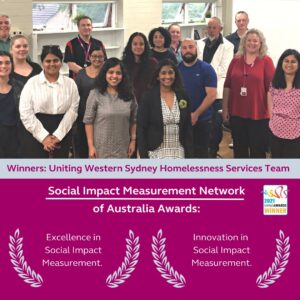 The 2021 SIMNA Award Winners were announced on last week, in an online gathering of Australia’s social impact measurement community.
The 2021 SIMNA Award Winners were announced on last week, in an online gathering of Australia’s social impact measurement community.
FRSA member Uniting NSW.ACT were a joint winner for the Excellence in Social Impact Measurement Award and the winner of the Innovation in Social Impact Measurement Award for their Specialist Homelessness Services (SHS) 360-Degree Outcomes Measurement.
Held annually by the Social Impact Measurement Network of Australia (SIMNA), the SIMNA Awards celebrate the many pioneering organisations and ground-breaking initiatives that are seeking to achieve the best possible outcomes for our communities and the environment.
Congratulations to the Uniting NSW.ACT Team!

National Anti-Racism Framework
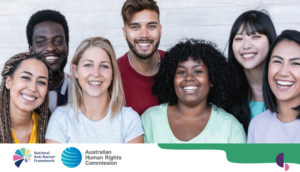 The Australian Human Rights Commission is inviting submissions to inform the development of a National Anti-Racism Framework (the Framework).
The Australian Human Rights Commission is inviting submissions to inform the development of a National Anti-Racism Framework (the Framework).
The Framework will be a long-term, central reference point to guide actions on anti-racism and equality by government, NGOs, business, communities, and other sectors.
The Commission is very interested to hear from those with expertise and knowledge of anti-racism initiatives and in responding to racism at structural, institutional, and inter-personal levels, including:
- Aboriginal and/or Torres Strait Islander knowledge holders and community members with lived experience of racism
- Community members from migrant, refugee and/or faith-based backgrounds with lived experience of racism
- Representatives from Aboriginal and Torres Strait Islander peak or community organisations
- Representatives from a migrant, refugee, settlement and faith-based peak or community organisation
- Representatives of Commonwealth, State and Local Government agencies and departments
- Representatives of human rights agencies, advocacy organisations or legal practitioners
- Practitioners and/or experts in the identified outcome areas of the Framework
- Researchers in the identified outcome areas of the Framework.
The Commission released a Concept Paper, which details proposed principles, outcomes and strategies for the Framework. It has also compiled a Submissions Guide, which provides more information on the Framework development process and shares findings from early stakeholder consultations.
The Commission invites submissions in any language and in any format, including writing, audio, video and images, subject to its Submissions Policy. You can fill out the guided submission form and/or upload your own file as a submission.
Submissions close Friday 4 February 2022. Find out more and make your submission via their website.
New Disability Employment Support Model
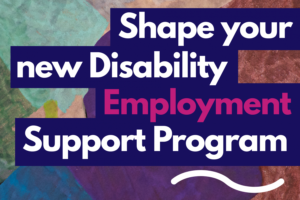 The Australian Government is committed to assisting more people with disability into jobs so they can enjoy the social and economic benefits that work brings. People with disability and employers need a system that meets their needs and provides the appropriate supports to find and keep a job. The current Disability Employment Services (DES) program concludes 30 June 2023, and will be replaced by the new disability employment support model.
The Australian Government is committed to assisting more people with disability into jobs so they can enjoy the social and economic benefits that work brings. People with disability and employers need a system that meets their needs and provides the appropriate supports to find and keep a job. The current Disability Employment Services (DES) program concludes 30 June 2023, and will be replaced by the new disability employment support model.
The aim is to help to create a model that best supports people with disability to find and maintain employment, and supports employers to employ people with disability and ensure their employment is successful.
The Department of Social Services (DSS) is undertaking public consultation to give more people a chance to have a say on what the new disability employment support model should look like. They want feedback and ideas on how they can achieve meaningful change and help more people with disability prepare for work, get a job, keep working and progress their careers.
Submissions close 1 February. Find out more via the DSS engage website.
Effective Online Group Leadership Workshop
SUNSHINE CIRCLES – Albury
SUNSHINE CIRCLES – Shepparton
If you have any events you’d like listed on the FRSA Events and Training Calendar, email Communications Officer, Vanessa Lam at communications@frsa.org.au. Please note that posting onto the Events and Training Calendar is reserved for FRSA Members only.
NSW
Team Leader, Family Relationship Centre | Relationships Australia NSW
NT
Family Dispute Resolution Practitioner (FDRP) and Family Law Pathways (FLPN) Project Officer | Relationships Australia Northern Territory
Family Dispute Resolution Practitioner | Relationships Australia Northern Territory
Counsellor / Community Engagement Officer Redress Scheme Support Service (Darwin) | Relationships Australia Northern Territory
Counsellor / Community Engagement Officer Redress Scheme Support Service (Alice Springs) | Relationships Australia Northern Territory
VIC
Client Services Officer – Kew | Relationships Australia Victoria
If you have any job vacancies you’d like listed on the FRSA Jobs Board, email Communications Officer, Vanessa Lam at communications@frsa.org.au. Please note that posting onto the Jobs Board is reserved for FRSA Members only.

Partnership Agreement on Closing the Gap: partnership health check 2021 | Coalition of Aboriginal and Torres Strait Islander Peak Organisations
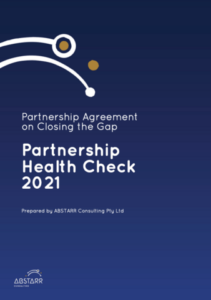
This publication reviews the state of the Partnership Agreement on Closing the Gap against success indicators agreed by the Coalition of Peaks and government parties. The 2021 health check has been prepared by independent reviewer, ABSTARR Consulting.
Adolescents combining school and part-time employment | The Longitudinal Study of Australian Children
 The latest snapshot of the Growing Up in Australia study examines the working lives and employment histories of young Australians in their secondary school years and explores how employment interferes with their health, study and social activities.
The latest snapshot of the Growing Up in Australia study examines the working lives and employment histories of young Australians in their secondary school years and explores how employment interferes with their health, study and social activities.
An improved understanding among practitioners of which student and job characteristics are linked to work-life interference can be used to guide students at the start of their working lives.
Family and domestic violence in Australia: prevalence, impacts and responses | Bankwest Curtin Economics Centre
This briefing note assesses the prevalence, impact of and responses to family and domestic violence (FDV) in Australia.
Amplify: turning up the volume on young people and family violence | Melbourne City Mission
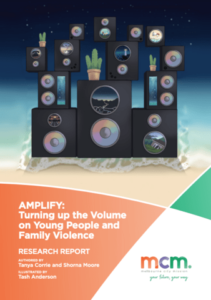 Melbourne City Mission commissioned this research to develop recommendations for service and policy responses for young people experiencing family violence that recognises the distinct needs of adolescents and young people, and the ways in which they are more likely to engage and respond to services.
Melbourne City Mission commissioned this research to develop recommendations for service and policy responses for young people experiencing family violence that recognises the distinct needs of adolescents and young people, and the ways in which they are more likely to engage and respond to services.
Do violent teens become violent adults? Links between juvenile and adult domestic and family violence | Australian Institute of Criminology
 Previous research exploring pathways into domestic and family violence (DFV) has primarily examined associations between early victimisation and future offending. Less is known about the relationship between adolescent DFV offending and adult DFV offending. This study examined the offending pathways of 8,465 young offenders aged 13–17, who were followed until age 23.
Previous research exploring pathways into domestic and family violence (DFV) has primarily examined associations between early victimisation and future offending. Less is known about the relationship between adolescent DFV offending and adult DFV offending. This study examined the offending pathways of 8,465 young offenders aged 13–17, who were followed until age 23.
What has been the impact of COVID-19 on debt? Turning a wave into a tsunami | Centre for Applied Macroeconomic Analysis (ANU)
This paper presents a comprehensive analysis of the impact of COVID-19 on debt, puts recent debt developments and prospects in historical context, and analyses new policy challenges associated with debt resolution.
PWDA language guide: a guide to language about disability | People With Disability Australia
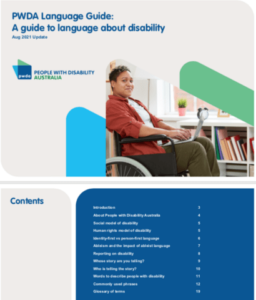 This guide has been written by people with disability to assist the general public and media outlets in talking about and reporting on disability.
This guide has been written by people with disability to assist the general public and media outlets in talking about and reporting on disability.
Community trauma toolkit | Emerging Minds
Emergencies and disasters are tremendously stressful and it is normal to feel overwhelmed. This time of year, extreme weather conditions are common, often causing floods, droughts and bushfires. The mental health of infants and children can be significantly impacted by these events, and they depend on the adults around them for safety and security.
This Community trauma toolkit contains resources to support adults and children before, during and after a disaster or traumatic event. It will help you understand some of the impacts of disasters and how you can help to reduce these impacts.
Losing traction: lessons in financial wellbeing from the COVID crisis | Brotherhood of St Laurence
As Australia reopens, it is easy to feel that the worst of the COVID-19 crisis is over. However, this analysis suggests recovery for many will be slow, with ongoing struggles making ends meet.
Want to submit something to the FRSA eBulletin?
If you have an news item or event that you would like to be featured in a future eBulletin please submit your announcement via the form below or email communications@frsa.org.au with the subject “FRSA eBulletin submission”.
Please note FRSA members receive priority for items posted in the eBulletin. And to keep information current, relevant and useful, submissions will not be repeated from week to week.
Subscribe
Subscribe to receive future eBulletin editions directly to your inbox!





